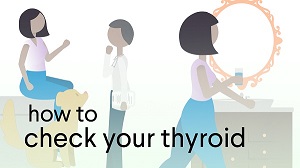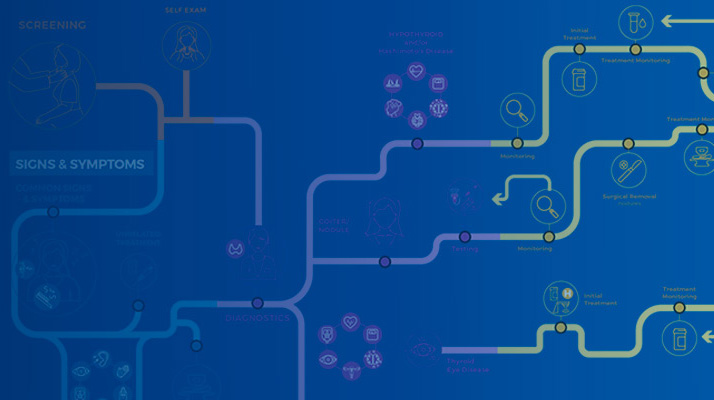What Is the Thyroid?
The thyroid gland is a small, butterfly-shaped gland located in the base of the neck just below the Adam's apple. Although relatively small, the thyroid gland plays a huge role in our body, influencing the function of many of the body’s most important organs, including the heart, brain, liver, kidneys and skin. Ensuring that the thyroid gland is healthy and functioning properly is vitally important to the body's overall well-being.
The thyroid creates two hormones — triiodothyronine (T3) and thyroxine (T4) — that travel throughout your body to regulate blood pressure, body temperature, heart rate, metabolism and how the body reacts to other hormones.
The level of hormones produced by the thyroid is controlled by the pituitary gland, often called the “master gland” of the body since it regulates many activities of other glands. The pituitary gland creates thyroid-stimulating hormone (TSH) that signals the thyroid to produce and release the right amount of hormone to meet the body’s needs. In turn, the pituitary responds to signals from the thyroid (T3 and T4) as well as from a part of the brain called the hypothalamus (which releases thyrotropin-releasing hormone or TRH), both of which control how the pituitary releases TSH.
What Are Common Thyroid Conditions?
Thyroid disease affects as many as 30 million Americans, and more than half remain undiagnosed.
Several disorders can arise if the thyroid produces too much hormone (hyperthyroidism) or not enough (hypothyroidism).
Other thyroid diseases include:
- Hashimoto’s disease
- Nodules
- Thyroid cancer
- Graves’ disease
- Thyroid eye disease
- Thyroid cancer
Undiagnosed thyroid issues can also place a person at increased risk for heart disease, osteoporosis, infertility and other serious conditions.
What Causes Thyroid Disease?
There are many factors that can contribute to the development of various thyroid disorders. In many cases, the cause is unknown. Some common risk factors for developing thyroid problems include:
- Family history
- Female gender – for instance, women are up to 5 times more likely to develop autoimmune thyroid diseases such as Graves or Hashimotos
- Radiation exposure to the neck
- Iodine deficiency or iodine excess
- Certain medications
What Are Common Thyroid Disease Symptoms?
If the thyroid does not function correctly, it can affect every possible aspect of a person’s life. Some common signs of thyroid disease include:
- Unexplained changes in weight
- Depression, anxiety or feelings of irritability
- Changes in memory or ability to concentrate
- Joint or muscle pain or weakness
- Fatigue or trouble sleeping
- Fast or irregular heartbeat
- Irregular menstrual periods
Because symptoms of thyroid disease can mirror those of other conditions, make sure to talk with your health care professional, or an endocrinologist, if you think you have a thyroid condition.
Visit our Journey for Patients with Thyroid Disease to learn more about signs and symptoms.
Learn More
How Are Thyroid Problems Diagnosed?
The first step is to speak with a health care professional about your symptoms. Since many thyroid-related symptoms may mimic those of other conditions, ask your health care professional if a thyroid test is needed to check your thyroid gland.
An endocrinologist is a specially trained doctor who is qualified to diagnose and treat hormone-related diseases and conditions, including thyroid cancer and all other diseases related to the thyroid gland. Find endocrine care in your area.
Visit our Journey for Patients with Thyroid Disease to learn more about thyroid diagnosis.
Learn More
How Are Thyroid Conditions Treated?
Prescription medications (and sometimes surgery) are used to adjust thyroid hormone levels. Treatment for thyroid disease varies depending on the specific condition.
Learn more about hyperthyroidism, hypothyroidism and Hashimoto’s disease.
Visit our Journey for Patients with Thyroid Disease to learn more about treatment options.
Learn More




